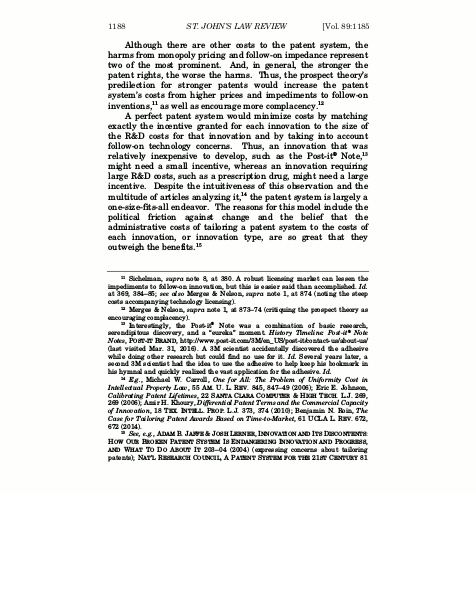

A Case for Weakening Patent Rights [PDF] (shown above are the first five pages among 70 in total)
"PTAB is at stake, Alice is at stake, and perhaps more aspects related to AIA and the Supreme Court (where vacancies exist for Justices, not just because of Scalia's death)."Gary D. Colby, writing for the New Jersey Law Journal (behind paywall), has just published and repeatedly pushed an article titled "Software Patent Eligibility May Be Informed by Copyright Law". The summary/outline says "Dissents in two recently decided cases suggest that patent eligibility of "intangible" inventions finds analogies in copyright eligibility."
Well, software developers want only copyright to protect their code. Many polls/surveys keep showing this, yet the patent microcosm ignores the findings and pretends that software patents are desirable (to the litigation industry they are definitely desirable, but at whose expense?).
As soon as the week started the patent microcosm started commenting on PTAB and "inventorship" (something the lawyers never did, they only speak about it). To quote the concluding part, "until the PTAB rules definitively that inventorship error is not a ground on which PGR may be based, it is our view that failure to raise that ground in a petition will most likely lead to an estoppel on the issue. See 35 U.S.C. ۤ 325 (e). Thus, for now, any PGR petitioner that thinks it might have a possible basis for challenging inventorship better raise that ground in its PGR petition or risk being estopped from later challenging the patent on that basis."
"Well, software developers want only copyright to protect their code."The term "inventorship" totally misses the point that patents are granted not necessarily for inventorship. These sorts of fairy tales that are perpetuated ad infinitum in legal blogs do a lot of harm and software patents propagandists (who do not even know how software works!) call reformists the "patent infringer lobby" because they are trying to undermine Alice and the likes of it. See this disgusting latest article from Watchtroll for example. What is this? Is Watchtroll some kind of a troll? A spokesperson for patent trolls?
One last article worth noting was published by Jason Rantanen about the Court of Appeals for the Federal Circuit (CAFC) and it said this:
As expected, for the fiscal year ending on October 31, 2016, the Federal Circuit docketed more appeals arising from the U.S. Patent and Trademark Office than from the district courts. This result will almost certainly hold true for the calendar year as well: from January through October of this year, the Federal Circuit received 471 appeals arising from the district courts and 560 appeals arising from the PTO.
"The term "inventorship" totally misses the point that patents are granted not necessarily for inventorship."The US is currently in the process of cleaning up a mess created (or culminating) in the David Kappos era and thankfully we now see software patents being invalided by the thousands and patent lawsuits (including the majority of which that are filed by patent trolls) in a freefall.
It's good for everybody. Except the patent microcosm... ⬆